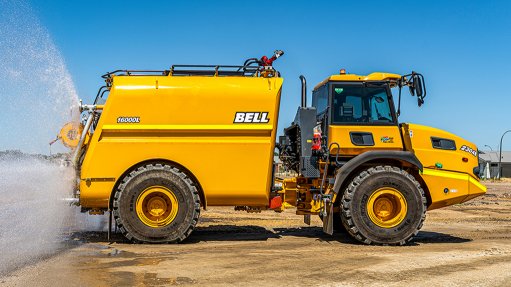
ALL THE BELLS AND WHISTLES
One of the primary purposes of a water tanker in construction is dust suppression
Photo by: Bell Equipment
Newly adapted water tankers complement local equipment manufacturer Bell Equipment’s competitiveness and have promoted ease and accuracy in mining and construction by increasing remote monitoring capabilities, providing automated diagnostics, improving control mechanisms and enhancing overall performance.
The Bell E-series articulated dump trucks, launched in 2013, have been adapted to offer a range of water tankers from 16 000 ℓ to 50 000 ℓ. The Bell water tankers have been designed with the ability for complete system integration.
Bell Equipment product manager Warren Swart says this integration enables the automation of innovative features to ensure consistent performance regardless of vehicle speed, gradient of the terrain or quantity of implements being operated.
One of the primary purposes of a water tanker in construction is dust suppression: “During dry seasons, dust suppression is a critical part of safety in mining and construction operations, from visibility improvements to pulmonary disease prevention, says Swart.
These water tankers are also used for material hydration, road construction and maintenance.
The 50 000 ℓ water tanker was specifically designed following interest from major mining companies that required an increase in capacity on longer runways for dust suppression.
He adds that the 50 000 ℓ tanker is paired with the B60E powerhead, making it “one of the largest articulated water tankers available on the global market”.
While it enables Bell to offer a full range of tanker sizes, the B60E water tanker, importantly, offers commonality of parts to the growing number of customers running B60E fleets.
The Bell Mining and Construction Specials division enables Bell Equipment to expand its design and manufacturing capabilities to provide specific products for individual markets while ensuring that the water tankers are produced according to the company’s high-quality standards, in line with the rest of its products.
“Our water tankers have a wide range of options and can be customised to meet customer requirements. Further, customisation can be achieved to control unique implements through a variety of control options.”
Bell Equipment offers a manual water cannon with a long-range spray nozzle and a remote water cannon that is controlled using a joystick within the cab.
Swart notes that this cannon has an adjustable fog and/or stream pattern and a variety of flow settings of between 1 100 ℓ a minute and 3 200 ℓ a minute. Additionally, both water cannons feature high-quality components, making them highly suitable for heavy-duty environments.
The water cannon complements Bell Equipment’s firefighting options with the ability for the stream to reach heights exceeding 30 m. Additional firefighting implements can be installed ranging from lay flat hoses to foam injectors.
Spray valves are fitted as standard with the option of expanding the spray pattern horizontally by choosing to include additional batter spray valves.
A range of rear spray bars are available. This includes a gravity-fed dribble bar that delivers an even spread pattern covering the width of the water tanker.
Penetration spray bars are also available, with either nozzles or holes, and are pressurised by the pump to create a jet of water that is not affected by wind, explains Swart.
He says these options are complemented with the design of an in-cab control panel for all water tanker functions.
“This provides an ergonomically sound control environment for the operator inside the cab. The in-cab control panel increases productivity and safety while also reducing wastage typically associated with manually opening valves.”
Further, the 16 000 ℓ water tanker was developed specifically to meet the needs of a niche international customer group which required smaller water tankers that could be used in tight industrialised areas.
The tanker has a low centre of gravity to reduce the risk of rollovers, while a fully engineered baffle system prevents water surge and slosh, consequently providing increased stability for greater safety in construction.
In addition, the water tankers are coated internally with a dual epoxy to prolong the life of the tanker.
Swart indicates that Bell adheres to international welding quality standards for earthmoving and construction equipment as well as additional Bell-specific quality inspection processes such as a pressurised leak test, which is performed on all tanks.
Challenges
There are several challenges pertaining to articulated water tankers, as they operate in tough environments and carry large quantities of water, says Swart.
Ensuring that the tankers are built to the required specifications to meet the demands of heavy-duty environments has been one of the biggest challenges.
Another challenge is meeting the “multitude of requirements” across an international market, as the preferred type of implements, and safety regulations, vary across different regions.
“Creating a single product that satisfies these requirements has only been achievable through designing the vehicle as a complete unit,” adds Swart.
Bell has continued and will continue to improve its manufacturing capabilities to meet increased demand while maintaining the versatility and durability of a strong reliable machine, he concludes.